Ernie Kovacs’ Eugene, originally telecast on ABC in 1961:
(This is the latest in a weekly series of arts-related videos that appear in this space each Wednesday.)
Archives for 2011
TT: Almanac
“The traveler was active; he went strenuously in search of people, of adventure, of experience. The tourist is passive; he expects interesting things to happen to him. He goes ‘sightseeing.'”
Daniel J. Boorstin, The Image: A Guide to Psuedo-Events in America
TT: A peek into the workshop
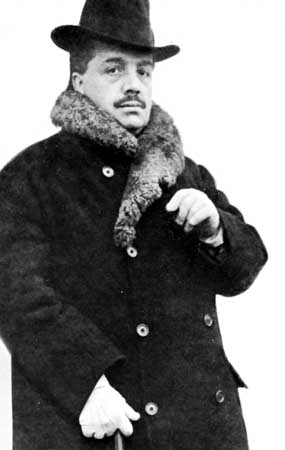 I posted last month about the new aria for Danse Russe that Paul Moravec and I are writing. It’s for the character of Sergei Diaghilev, the founder of the Ballets Russes. In it he describes how it feels to be an impresario who cannot create a work of art on his own.
I posted last month about the new aria for Danse Russe that Paul Moravec and I are writing. It’s for the character of Sergei Diaghilev, the founder of the Ballets Russes. In it he describes how it feels to be an impresario who cannot create a work of art on his own.
I thought you might enjoy reading the text, which I wrote in a hotel room in Sarasota a few weeks ago and which Paul is now setting to music in his studio in Manhattan.
* * *
DIAGHILEV (speaking) And there they go. Full of excitement, full of ideas, sure of themselves–and sure they don’t need me. You heard them. (Imitating STRAVINSKY) “He thinks he knows everything–but he knows nothing.”
(Singing) No one will ever know
What happens before the curtain rises.
All the people see is the show,
And no one will ever know
The struggles and the fears
Of the man everyone despises.
My work, my life,
They’ll slip through the fingers
Of memory,
And no one will ever know
What I did,
What I do,
How I make them all come through.
(With mock grandiosity, quoting himself) “I am the impresario,
The man behind the scenes.
I put the players in the pit,
The dancers on the stage…”
(Wistfully) I dream of things,
Beautiful things
That no one in the world
Has ever done or seen.
They flash before my sleeping eyes
Like pictures on a screen–
But not quite clear enough,
Never, ever clear enough,
And then…
Only then…
He gestures to the left, then to the right. STRAVINSKY and NIJINSKY appear from opposite sides of the stage, carrying sticks to which marionette strings are attached. The strings are attached to their bodies. They hand the sticks to DIAGHILEV, who starts to manipulate the two men.
(Briskly) Do this! Do that!
Let’s try a different hat!
The pas de deux is boring
And the clarinets are flat!
The steps are trite,
The tune’s not right,
Fix everything
And fix it now–
We open tonight!
He hands the sticks back to STRAVINSKY and NIJINSKY, who exit.
I cannot dance,
I cannot sing,
I cannot write the simplest melody–
But I can hire a hall
And bring men together
To paint all the pictures
That flash through my mind
In the silence of the night–
But not quite clear enough,
Never, ever clear enough.
Without them, I’m nothing.
Without me, they’re…
(Speaking, with a touch of irony) Something.
But something different,
Maybe better, maybe worse–
But different.
(Singing) And no one will ever know
What I did,
What I do,
How I make them all come through,
How I help them to see
What is new,
What is true.
TT: Almanac
“The only way of catching a train I have ever discovered is to be late for the one before.”
G.K. Chesterton, “The Prehistoric Railway Station”
TT: Hither, yon, and back again
 Mrs. T and I are in Melbourne, Florida, this morning, sitting on the balcony of a room in a beachfront hotel and listening contentedly to the waves. A little later today we’ll drive back to Winter Park, where I have three days’ worth of work to do. Among other things, I’ve finished outlining the fifth chapter of my Duke Ellington biography, and it’s just about time to start writing.
Mrs. T and I are in Melbourne, Florida, this morning, sitting on the balcony of a room in a beachfront hotel and listening contentedly to the waves. A little later today we’ll drive back to Winter Park, where I have three days’ worth of work to do. Among other things, I’ve finished outlining the fifth chapter of my Duke Ellington biography, and it’s just about time to start writing.
As for our weekend by the sea, allow me to quote myself:
Coming as I do from the middle of America, I find at the age of forty-nine that I can count on the fingers of both hands the number of nights I’ve slept by an ocean. Like everyone who falls in love with the sea in adulthood, I’m incapable of saying anything about it that hasn’t been said a million times before: its ever-changing, self-renewing presence instantly reduces me to clichés. As I sat on the boardwalk and watched the waves that my beloved Fairfield Porter painted so well, I could do no better than to recall the words of Jean de la Ville de Mirmont that Gabriel Fauré set to music with such exquisitely apposite simplicity in L’horizon chimérique, the most perfect of all his song cycles: The sea is infinite and my dreams are wild.
I wrote that paragraph five years ago. I’ve slept by the sea quite a few more nights since writing it, but otherwise I stand by every word.
On Thursday I head south for the premiere of Steven Caras: See Them Dance, Deborah Novak’s documentary about the dancer-photographer, which will take place at 7:30 p.m. at Kravis Center for the Performing Arts in West Palm Beach. I’m in the film, and I’ll also be conducting an onstage interview with Steve and Deborah immediately after the screening. This is an article about the film that appeared in yesterday’s Palm Beach Daily News.
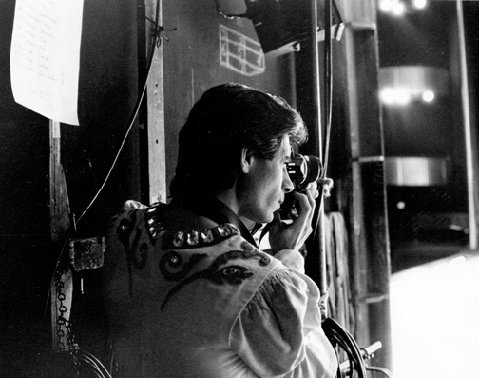 For more information about the screening, go here.
For more information about the screening, go here.
On Friday morning I resume Pops-related activities one more time in order to take part in the latest installment of Parker Ladd’s Author Breakfast Series at the Brazilian Court in Palm Beach. I’m making a joint appearance with Stacy Schiff, the author of Cleopatra: A Life. The two of us will be talking about and signing copies of our respective books over breakfast at Café Boulud. Reservations are required for this $100-a-ticket event, which kicks off at 8:45 a.m. This is an article about the series that appeared last November in the Palm Beach Daily News.
Yes, I’m a little staggered. So far as I know, nobody in the world has ever paid a hundred bucks to see me talk, though the price of the ticket also includes breakfast, valet parking, and a copy of one of our books, which makes the whole thing sound a bit less implausible. Nevertheless, I look forward to seeing whether anybody shows up!
For more information, go here.
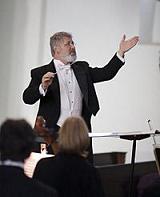 On Saturday I return to Winter Park, where I’ll be conducting a public interview with John Sinclair, the artistic director and conductor of Winter Park’s Bach Festival Society concerts. John is leading a performance of Beethoven’s Fifth Symphony and Mozart’s C Minor Mass on Sunday afternoon, and I’ll be chatting with him about the experience of rehearsing and conducting the program. Our joint appearance is at Rollins College’s Bush Auditorium at 7:30 p.m.
On Saturday I return to Winter Park, where I’ll be conducting a public interview with John Sinclair, the artistic director and conductor of Winter Park’s Bach Festival Society concerts. John is leading a performance of Beethoven’s Fifth Symphony and Mozart’s C Minor Mass on Sunday afternoon, and I’ll be chatting with him about the experience of rehearsing and conducting the program. Our joint appearance is at Rollins College’s Bush Auditorium at 7:30 p.m.
Admission is free, but space is limited, so go here to reserve a seat.
And what about Sunday? Well, I’ll cross that bridge–or, rather, fly that plane–when I come to it….
* * *
Listen to Gérard Souzay and Jacqueline Bonneau perform Fauré’s L’horizon chimérique:
TT: Almanac
“To travel hopefully is better than to arrive.”
Robert Louis Stevenson. “El Dorado”
TT: Too much of a good thing
In today’s Wall Street Journal I review two shows, The Diary of a Madman at Brooklyn’s BAM Harvey Theater and Shhhh! at Garden Theatre in Winter Garden, Florida. Here’s an excerpt.
* * *
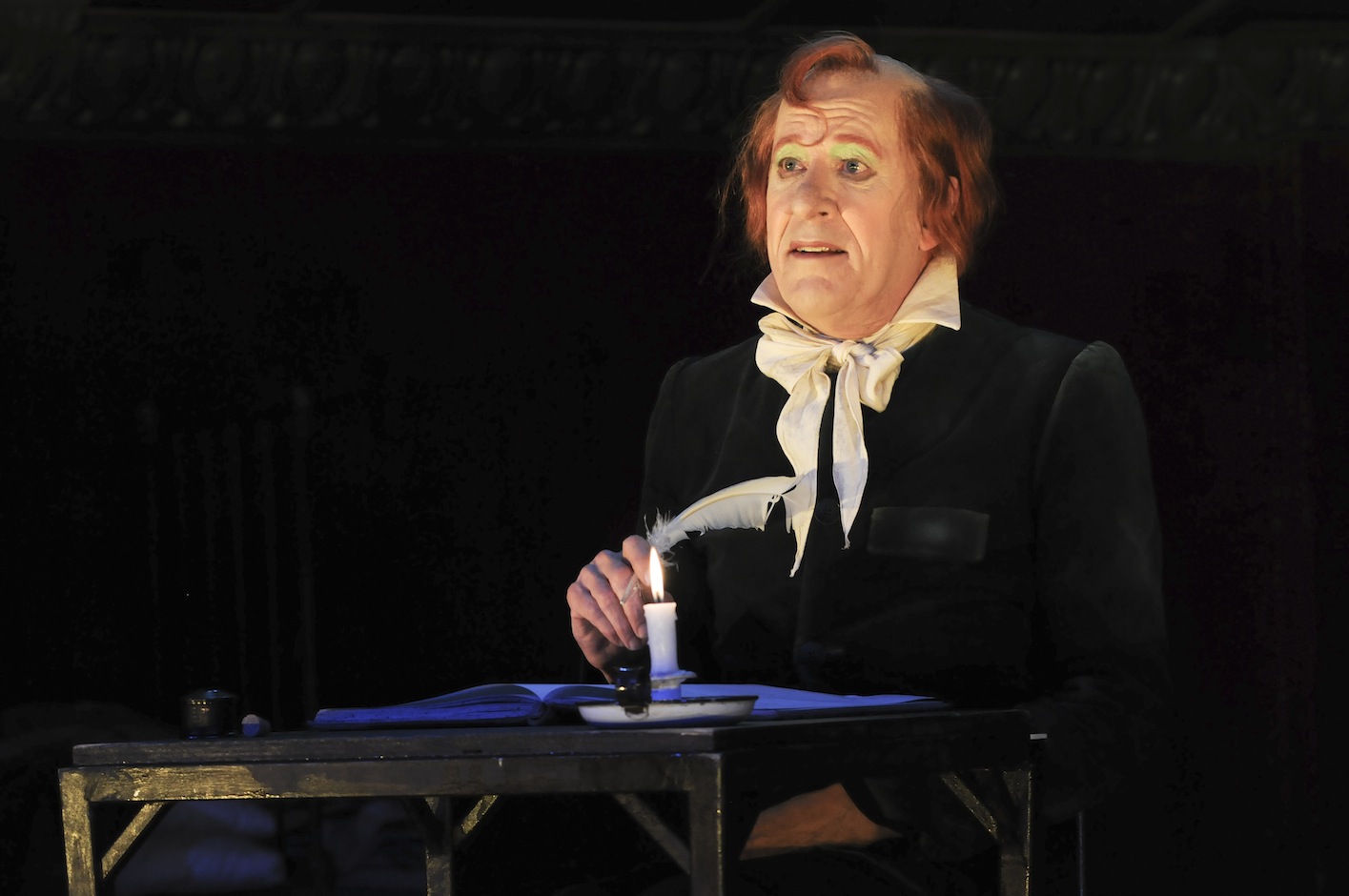 Everyone knows what Geoffrey Rush has been up to lately, but when he’s not giving Oscar-nominated performances in movies about stuttering kings, he can frequently be seen on the stage. His first such appearance in New York, in the 2009 Broadway revival of Eugène Ionesco’s “Exit the King,” won him a Tony. Now he’s back in town, playing another man at the end of his rope. “The Diary of a Madman” is David Holman’s stage version of Nikolai Gogol’s 1835 short story about an obscure civil servant who goes mad and proclaims himself to be the King of Spain. No one will be surprised to hear that Mr. Rush, who won an Oscar playing a schizophrenic in “Shine,” gives a spectacularly flamboyant performance as Poprishchin, a Clerk of the Ninth Grade who spends his days trimming quill pens and dreaming of glory. But in spite of all the excitement that Mr. Rush is stirring up at the BAM Harvey Theater, I can’t say that I found “The Diary of a Madman” to be convincing, much less moving.
Everyone knows what Geoffrey Rush has been up to lately, but when he’s not giving Oscar-nominated performances in movies about stuttering kings, he can frequently be seen on the stage. His first such appearance in New York, in the 2009 Broadway revival of Eugène Ionesco’s “Exit the King,” won him a Tony. Now he’s back in town, playing another man at the end of his rope. “The Diary of a Madman” is David Holman’s stage version of Nikolai Gogol’s 1835 short story about an obscure civil servant who goes mad and proclaims himself to be the King of Spain. No one will be surprised to hear that Mr. Rush, who won an Oscar playing a schizophrenic in “Shine,” gives a spectacularly flamboyant performance as Poprishchin, a Clerk of the Ninth Grade who spends his days trimming quill pens and dreaming of glory. But in spite of all the excitement that Mr. Rush is stirring up at the BAM Harvey Theater, I can’t say that I found “The Diary of a Madman” to be convincing, much less moving.
Part of what’s wrong with this production, which has been staged to the hilt and back again by Neil Armfield, the director of “Exit the King,” is its underlying premise. Gogol’s story, a monologue in which we behold madness bursting into flower, is a masterpiece of dramatic economy. Not one of its eight thousand words is wasted. To present it on the stage, all you have to do is read it out loud in a setting of the utmost simplicity, letting the text do the work. Mr. Holman’s adaptation, on the other hand, erects a massive, self-consciously theatrical superstructure on top of the story…Mr. Rush is made up to look like a decayed, eye-shadowed dandy in a tattered velvet suit. Nothing is left to the imagination: All of Gogol’s effects are spelled out with the utmost explicitness.
The same is true of Mr. Rush’s frenetic performance, which is a tour de force in both the best and worst senses of the phrase. He flutters around like a demented marionette, embroidering every line with brilliantly ingenious tricks at which you cannot help but gape admiringly–but which distract you from Poprishchin’s desperate plight….
Farce usually relies on a mixture of high-speed dialogue and high-energy physical action, but PB&J Theatre Factory, a company of Florida actors who write their own material, has pulled a switch on the classic formula in “Shhhh!” In this four-door farce, a pair of Laurel-and-Hardyesque jewel thieves who are on the lam hide out in a rundown hotel that looks empty but turns out to be fully occupied with a diverse collection of peculiar people. What makes “Shhhh!” so fresh is that there’s no dialogue: The characters emit cries of pain and horror and utter isolated words here and there, but beyond that, nobody says anything. The comedy is entirely physical and enormously clever…
* * *
Read the whole thing here.
TT: Good and popular
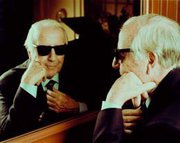 Today’s Wall Street Journal “Sightings” column is a tribute to George Shearing. Here’s an excerpt.
Today’s Wall Street Journal “Sightings” column is a tribute to George Shearing. Here’s an excerpt.
* * *
George Shearing, who died on Monday, was a great jazz pianist. For much of his long lifetime, he was also one of the 20th century’s most successful entertainers, a purveyor of super-smooth easy-listening music that was distinguishable from Muzak only because he played it with perfect taste. That was part of what made him so admirable an artist: Even when he was making music for the masses, he did it without a hint of condescension.
Mr. Shearing, who was born in England in 1919, started out as a standard-issue swing-era piano player. Then he moved to the U.S. in 1947, heard what the boppers were doing on 52nd Street, and decided to do likewise. Blessed with an ear sharp enough to hear a gnat shrug, he easily mastered bop’s complex vocabulary, but decided that it was too abrasive to give pleasure to ordinary listeners. In 1949 he put together a quintet with an offbeat instrumentation–piano, vibraphone, guitar, bass and drums–that played everything from pretty-pretty ballads to such hell-for-leather bebop anthems as Denzil Best’s “Move.” He kept the textures light and the solos concise, and the public, not surprisingly, loved what it heard. “September in the Rain,” the quintet’s first single, sold nearly a million copies….
Mr. Shearing’s willingness to work both sides of the street vexed jazz critics, who are not an especially tolerant lot, and by the ’60s he had been written off as a popularizer. In fact, though, he was something completely different, a dead-serious artist who enjoyed playing well-crafted music that was accessible to a popular audience. One of my favorite Shearing records is a quintet-plus-strings performance of “Early Autumn” from a 1961 album called, believe it or not, “Satin Affair.” Yes, it’s elevator music–but if you don’t respond to its elegance, then you’re not paying attention….
* * *
Read the whole thing here.
